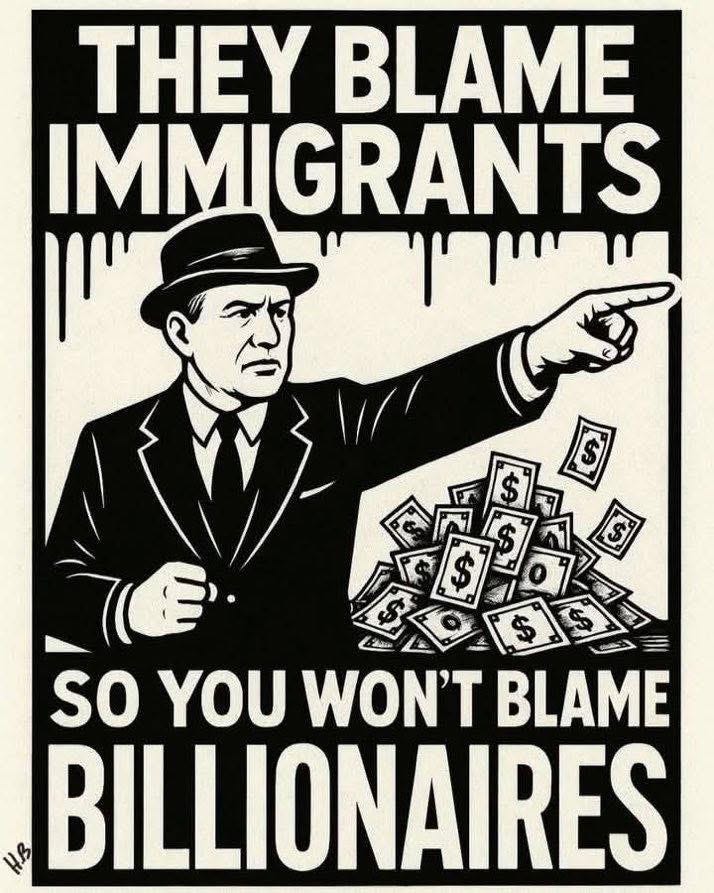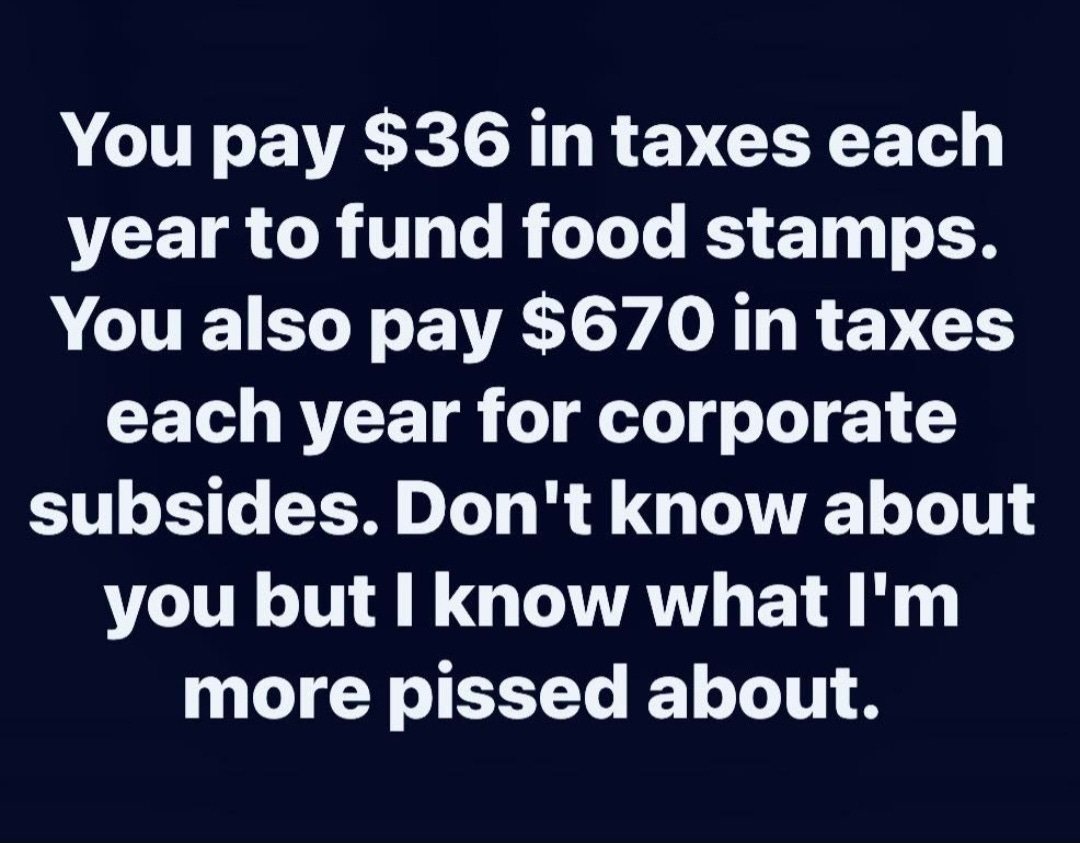
You’re about to experience what poor people already know: what it’s like when you can’t buy the thing you need.
Trump’s tariff tantrum is about to empty store shelves. The slow pace of cargo ships coming from China is such that even if he called off tariffs tomorrow, we’d still have a shortage of imported goods for several weeks.
It’ll be March 2020 all over again, except with everything, not just groceries.
The poor are experts at this
I’ve spent years stretching dollars and making do. I can tell you how to deal when the thing you need is simply not obtainable. I am used to solving this issue because I’ve had so many times in my life when I lacked sufficient funds to just go buy whatever it was my family needed.
If you are quite wealthy, none of this is a concern to you. You will find ways to pay for whatever you want. That is the way of the world.
But if you are not wealthy but also not poor, you may have no experience in dealing with this, so read on.
Stock smart, not scared
I always keep my pantry well-stocked, and have since around the year 2000, when a blizzard immobilized my community. That is when I realized that grocery stores don’t just have endless stock in the back they’ll go fetch when a shelf goes bare.
You could buy things like canned and boxed food, but if you wanted bread, milk or bananas, you were out of luck. There was nothing. I should have known this, as my mother worked for a food brokerage company many years ago, but there’s nothing like staring at an empty shelf to wake you up.
Many of you had such an experience when the pandemic hit, but I did not. I knew it was coming and topped off my pantry a bit more. I have done the same thing now.
There’s a fine line between hoarding and preparing. Please don’t cross it. Everything I have purchased is stuff we routinely eat. We will use every can of black beans and every bit of the brown rice, pasta and tomato products I have.
Don’t buy any food as a potential last-resort meal and then (assuming you don’t get to that point) throw it out in a year. Rotate your stock and use it all.
I have lots of flour, a stock of wheat berries, a grain mill and Seymour, my sourdough starter. I have dried milk. I have a reasonable supply of other things like this. Don’t forget olive oil and pet food.
And if you have space for a garden, it’s not to late to start one! (Are you aware of how much fresh produce we import? Think about it and grab a hoe.)
It’s not just food
I told my daughter to buy whatever shoes she thinks her children will need for the summer, because we virtually don’t make shoes in this country anymore. I bought a pair of high-top black Chucks I had coveted for years because I just dropped a shoe size and I am sure they will cost more soon.
If you need some kind of medication, get it now if you can. You might not be able to, thanks to insurance rules, but do what you can. If it’s something like an over-the-counter allergy drug you really depend on every spring, grab enough now.
Look around your house. If there’s something you’ve been meaning to get, don’t wait.
This week I had a new furnace installed in the house my adult son rents from me. I had known it needed replacement, but I would have seen if I could put it off if not for looming tariffs. How much extra will a new furnace cost three months from now? I have no idea, but I’m willing to bet I saved a few hundred bucks.
My husband needs a new computer monitor and his usual method of shopping is to check every single store in the known universe and then stew about it for a month or more before reluctantly parting with money.
I laid it out for him straight: “So what you’re going to do is hem and haw and do without the monitor you need until the tariffs kick in, and then be mad, right?” So he agreed to buy it tonight.
It’s looking like a low-spend year
I had planned for this to be a low-spend year for lots of reasons, but instead I’ve moved up a lot of purchases. I’m OK with that. These are all things we would have bought eventually. I’ve just crammed most of the things we would have bought for the next six months into the last few weeks.
Last year I spent more than usual because it was the first time in about a decade that I had some ease in the budget. A viral Medium story dumped enough money into my account to allow me to take care of all sorts of unmet needs including a new vacuum cleaner, some dental work, a car repair — and a better emergency fund. This is a good time to dip into that emergency fund if you are lucky enough to have one.
Lean into second-hand
Remember when nobody could purchase furniture after the pandemic? People rediscovered second-hand furniture.
Most vintage furniture is cool and well-made. I’m working at a solid mahogany antique desk that I bought for $100 on Facebook Marketplace. I will never need another desk. My grandchildren could use this desk if they wanted. Before this, I bought any number of shitty particle-board desks that I had to put together with an allen wrench. All are in landfills now.
Yes, you can find good things in thrift stores, especially stuff that people typically need for only a short period, like strollers or toddler beds. You can get all the dishes and kitchen stuff you need for practically nothing. If you’re a young adult just launching, be willing to buy your toaster and sauce pans second-hand.
Fix, don’t toss
There’s actually a shoe repair place in my small town, which is nice. When I wore high heeled pumps every day (long ago!) I regularly had the little piece at the back of the heel replaced. It was always the first thing to wear out.
It’s not easy to fix many things now, by design. We had to buy an entirely new refrigerator when one measly part of a six-year-old fridge broke. It was a waste, but it was going to cost far more to fix it than just to replace it. Maybe with shortages, that will change.
Do you have a basic sewing kit? It might finally be worth your time to learn simple clothing repairs instead of discarding and buying new.
When the country falls apart, somebody still has to cook dinner
Oddly, it seems that even as the country goes to hell, you still need to carry on. Most of everyday life continues. You still have to cook dinner and clean the kitchen. How is your supply of dish detergent, by the way?
The old saying was “Use it up, wear it out, make it do or do without.” If you’re lucky enough to have lived in abundance, now’s the time to listen and learn from the rest of us.
And now, here’s this week’s inequality roundup:
This round-up is a one-stop shop for everyone who cares about this topic and a great place to discover new Substacks. If you find one you appreciate, subscribe! You’ll find the juicy memes at the end.
Am I Financially Screwed Forever?
William A. Finnegan, The Long Memo
What we’re living through now isn’t a recession—it’s a deliberate act of economic arson.
The Landlords of the Internet: How Big Tech Became the New Slumlords of the Working Class
Greedbane
Every empire figures out how to make the poor pay for their own chains. The oil barons turned pollution into profit. The railroad tycoons bought off Congress to lay tracks through working-class homes. And now, Silicon Valley has completed the cycle—by turning your behavior, your conversations, and your labor into assets they can rent back to you.
Press-on nails as a recession indicator?
Dana Miranda, Healthy Rich
Calling young women a “new recession indicator” this year because they’ve been Googling brown hair is insulting (or, it would be, if it weren’t just the opportunistic repackaging of a social media trend). If anyone has been paying attention, women have been a clear indicator that this economic system is in crisis for a very long time — and they’ve been demanding solutions for longer than they’ve been allowed to vote.
How to Build a Local Power Bloc: A Step-by-Step Guide to Economic Resistance
Greedbane
The economy wasn’t built to serve you—it was built to extract from you.
Every time you swipe your card, pay your rent, or clock into work for someone else’s profit, you’re feeding a system that takes more than it gives.
It’s time to flip that.
A Local Power Bloc is a worker-led zone of economic resistance.
It’s what happens when a community stops begging for scraps from corporations or bureaucrats—and starts building its own self-sustaining economy from the inside out.
Jobs for the Poor Build Character; Jobs for the Rich Build Wealth
Michelle Teheux, Untrickled
… we have concocted all kinds of myths in order to convince poor people to do shitty jobs for low wages so that the upper classes can enjoy the cheap labor of poor people and their children.
Jamie Dimon, CEO of JPMorgan Chase, often talks about the “dignity of work.” I checked out his bio and was positively shocked to see his summer job while attending Harvard was not detasseling or working at McDonald’s or scooping up ice cream at a mall.
Nope, his summer job was at Goldman Sachs.
Full disclosure: I have never worked at Goldman Sachs, so perhaps I’m dead wrong when I say I suspect that job involved a lot less sweat, dirt and physical exertion than the summer jobs people like my children and I worked in our youths.
From Builders to Bankers: How We Started Manufacturing Bullshit Instead of Futures
Corbin Trent, America’s Undoing
We've created a system where money chases money in endless circles, completely divorced from building anything of value. My uncle once took a job as a bag boy with the local A&P and made enough for an apartment and a new Camaro. That world didn't disappear by accident—it was dismantled by policy choices Democrats either championed or failed to fight.
Democrats talk about globalization, automation, and financialization like they're hurricanes—unstoppable forces of nature. But these aren't natural phenomena. They're the results of trade deals, tax codes, and regulations that human beings created and could change.
Empire at Home
Greedbane
Internal Colonies—Not Left Behind, Left Wide Open
We like to say some places in America are “left behind.”
But that’s not what happened.
Places like Flint, Pine Ridge, and Appalachia weren’t forgotten.
They were targeted. Used. And discarded.
Flint, Michigan.
A majority-Black city stripped of local power by a state-appointed “emergency manager.”
The water was switched to save money. Children were poisoned.
And the same people who made the call walked away with pensions and promotions.
That wasn’t a mistake. It was an extraction.
Link Round-Up: The Short-Changed Working Class …
Joan DeMartin, The Poverty Trap
What is it, exactly, about the American system that it chooses not to help the poor in any significant way, in fact, to punish the poor and at the same time help the rich get richer by our laws, policy choices, and perhaps most powerfully, our myths about the poor.
Why Elon Musk Wants to Kill the Weekend
Greedbane
There’s a growing push for the four-day workweek, backed by studies that show it increases productivity, improves mental health, and reduces burnout. And yet billionaires still fight it—not because it doesn’t work, but because it empowers you.
Shared by Lesley
Shared by
Shared by
Shared by
About Michelle Teheux
I’m a writer in central Illinois. If you like my work, subscribe to me here and on Medium. I also have a new Substack aimed at authors who want to self-publish books, called The Indie Author. My most recent book is Strapped: Fighting for the soul of the American working class. My most recent novel is The Trailer Park Rules. If you prefer to give a one-time tip, I accept Ko-fi.
All wealthy families are alike; each poor family is poor in its own way.
— Leo Tolstoy, if he had written about a trailer park
For residents of the Loire Mobile Home Park, surviving means understanding which rules to follow and which to break. Each has landed in the trailer park for wildly different reasons.
Jonesy is a failed journalist with one dream left. Angel is the kind of irresponsible single mother society just shakes its head about, and her daughter Maya is the kid everybody overlooks. Jimmy and Janiece Jackson wanted to be the first in their families to achieve the American dream, but all the positive attitude in the world can’t solve their predicament. Darren is a disabled man trying to enjoy his life despite a dark past. Kaitlin is a former stripper with a sugar daddy, while Shirley is an older lady who has come down in the world and lives in denial. Nancy runs the park like a tyrant but finds out when a larger corporation takes over that she’s not different from the residents.
When the new owners jack up the lot rent, the lives of everyone in the park shift dramatically and in some cases tragically.
Welcome to the Loire Mobile Home Park! Please observe all rules.
























I see things getting much worse. Stephen Miran, the chairman of the president’s Council of Economic Advisers, sounded an upbeat note about today’s jobs data, which showed that U.S. employers added 177,000 jobs in April and that the unemployment rate was unchanged at 4.2 percent. Look, Stephen. The jobs report is jobs added through April 12. The April 2 Liberation Day tariff war was just starting.stopping.starting.stopping.something. Give me a break.
Trump will add $720 billion to the annual budget first, and then say he wants to cut $163 billion (that won’t fly). That add that I see is before the new tax cut happens. The $720 billion added includes the expiring TCJA, the 2017 old tax cut. Speaker Johnson does not want you to see him hiding that renewal. Look at the real numbers and the source data. It is frightening, but we will try to shut them down.
.https://hotbuttons.substack.com/p/over-budget-chaos?r=3m1bs
Maybe three weeks ago, my roommate put Hershey’s cocoa powder on the shopping list. She knows to specify if she wants a name brand instead of a store brand, and she prefers the Hershey’s.
There wasn’t any. The whole section was empty except for eight or ten cans of the store brand. Somebody had cleaned them out of ALL the name brand, every size and variety. They’ve never restocked it.
It’s already started.
Despite stocking up a month ago and being nowhere near ready for more, I just bought enough coffee to last me through the end of the year.
If it will keep and we don’t make it here - like coffee and cocoa - stock up if you can. It’s sure not going to get any cheaper in the future regardless of what happens next.